" . . . like a dove/That slants unswerving to its home and love."
Earlier this week, about an hour before sunset, I was out for a walk, my attention drawn to the sky in the west. The waters of Puget Sound were a dark slate-grey, with a slight undertone of purple. Beyond the Sound, on the horizon, the Olympic Mountains stood in a row. The sky to the east was mostly clear. But directly overhead was the leading edge of a layer of cloud which extended across the water, ending in a long straight line above the mountains.
The descending sun was hidden. Yet a glowing path of yellow sky ran from north to south between the silhouette of the mountain range and the far dark edge of the cloud layer. That band of changing golden light -- soon to vanish -- demanded one's attention: what would come of it between now and sunset?
I kept walking, looking to the west. The twilit road passed through a meadow, a scattering of trees on either side. Suddenly, just ahead of me, an owl glided quickly and silently downward from left to right above the road, landing in a nearly leafless tree out in the meadow, beside a grove of pines.
Last week, I read this:
Beauty
What does it mean? Tired, angry, and ill at ease,
No man, woman, or child alive could please
Me now. And yet I almost dare to laugh
Because I sit and frame an epitaph --
'Here lies all that no one loved of him
And that loved no one.' Then in a trice that whim
Has wearied. But, though I am like a river
At fall of evening while it seems that never
Has the sun lighted it or warmed it, while
Cross breezes cut the surface to a file,
This heart, some fraction of me, happily
Floats through the window even now to a tree
Down in the misting, dim-lit, quiet vale,
Not like a pewit that returns to wail
For something it has lost, but like a dove
That slants unswerving to its home and love.
There I find my rest, and through the dusk air
Flies what yet lives in me. Beauty is there.
Edward Thomas, The Annotated Collected Poems (edited by Edna Longley) (Bloodaxe Books 2008), page 58. Thomas wrote the poem on January 21, 1915. Ibid, page 186.
Ethelbert White (1891-1972), "Edge of the Village" (1924)
Edward Thomas' life story tends to draw attention away from his poetry. This is not surprising. Born to be a poet, he married at a young age, left Oxford without taking a degree, and became a prolific writer of prose in order to support his family. He was beset with melancholy, misery, and dejection. Then, in the autumn of 1913, came the fated and wondrous meeting with Robert Frost. This friendship, coupled with the beginning of war in 1914 and his subsequent enlistment, led to a poetic flowering which lasted just over two years (the first of his poems was written on December 3, 1914; the final poem was written on January 13, 1917). The tragic end -- which cannot help but be in the back of our minds as we read his poems -- came at Arras in France on April 9, 1917.
Yes, the short arc of his life is compelling and moving. But it is the 140 or so poems he wrote during those two charmed years that deserve our attention. "I may as well write poetry. Did anyone ever begin at 36 in the shade?" So he wrote in a letter to Eleanor Farjeon on August 2, 1914. (Eleanor Farjeon, Edward Thomas: The Last Four Years (Oxford University Press 1958), page 81.) We are fortunate that he began "at 36 in the shade." For he is in his poetry, and we are the better for it. "Beauty" is a perfect instance. The first ten lines are a harrowing and accurate account of who he was. And yet the final eight lines (which begin with the wonderful turn at "This heart . . .") are an affecting, lovely, and equally accurate account of who he was. He never dissembles or postures in his poetry.
Kingsley Amis (who was not easy to please) recognized this quality: "How a poet convinces you he will not tell you anything he does not think or feel, since you have only his word for it, is hard to discover, but Edward Thomas is one of those who do it." (Kingsley Amis, The Amis Anthology (Hutchinson 1988), page 339.) Amis' comment is reminiscent of something which Thom Gunn wrote of Thomas Hardy: "And we never for a moment doubt that Hardy means what he says. . . . [Y]ou never feel, even in Hardy's most boring and ridiculous poetry, that he is pretending -- he is never rhetorical. And there are not many poets of whom this can be said. . . . Much of what sustains me through the flatter parts of the Collected Poems is this feeling of contact with an honest man who will never lie to me." (Thom Gunn, "Hardy and the Ballads," in Thom Gunn, The Occasions of Poetry: Essays in Criticism and Autobiography (North Point Press 1985), pages 104-105.) I believe that Gunn's comments apply equally well to Edward Thomas. (It is not surprising to discover that Hardy admired Thomas' poetry, which he became aware of only after Thomas' death.)
As it happens, Amis' comment is in fact an echo of Thomas' own words about what it means to be a poet:
"Here, I think, in [John Clare's] 'Love lives beyond the tomb,' in this unprejudiced singing voice that knows not what it sings, is some reason for us to believe that poets are not merely writing figuratively when they say, 'My love is like a red, red rose,' that they are to be taken more literally than they commonly are, that they do not invent or 'make things up' as grown people do when they condescend to a child's game. What they say is not chosen to represent what they feel or think, but is itself the very substance of what had before lain dark and unapparent, is itself all that survives of feeling and thought, and cannot be expanded or reduced without dulling or falsification. If this is not so, and if we do not believe it to be so, then poetry is of no greater importance than wallpaper, or a wayside drink to one who is not thirsty. But if it is so, then we are on the way to understand why poetry is mighty; for if what poets say is true and not feigning, then of how little account are our ordinary assumptions, our feigned interests, our playful and our serious pastimes spread out between birth and death."
Edward Thomas, Feminine Influence on the Poets (Martin Secker 1910), page 86.
Ethelbert White, "The Farm by the Brook" (1929)
"What are days for?/Days are where we live. . . . Where can we live but days?" (Philip Larkin, "Days.") "For the days are long --/From the first milk van/To the last shout in the night,/An eternity." (Derek Mahon, "Dream Days.") Here is a further thought for consideration: days are where beauty dwells. "Beauty is there."
Eleanor Farjeon writes that Thomas' "secret self pined for beauty." (Eleanor Farjeon, Edward Thomas: The Last Four Years, page 41.) Yet, as Larkin perceptively observes: "What a strange talent his was: the poetry of almost infinitely-qualified states of mind." (Philip Larkin, letter to Andrew Motion (May 16, 1979), in Anthony Thwaite (editor), Selected Letters of Philip Larkin 1940-1985 (Faber and Faber 1992), page 599.) These two characteristics often appear together in Thomas' poems.
But perhaps this gets to the heart of the matter for Thomas (and indeed for us as well):
"I am certain of nothing but of the holiness of the Heart's affections and the truth of Imagination -- What the imagination seizes as Beauty must be truth -- whether it existed before or not -- for I have the same Idea of all our Passions as of Love[:] they are all[,] in their sublime, creative of essential Beauty."
John Keats, letter to Benjamin Bailey (November 22, 1817), in Robert Gittings (editor), Letters of John Keats (Oxford University Press 1970), pages 36-37.
As one might expect, Thomas was aware of the passage from Keats' letter. He wrote a literary biography of Keats. In a chapter titled "Keats and His Friends," Thomas mentions Benjamin Bailey, and then notes: "It was in a letter to Bailey that Keats said he was certain of nothing but 'the holiness of the Heart's affections, and the truth of imagination'." (Edward Thomas, Keats (T. C. & E. C. Jack 1916), page 30.)
The Ash Grove
Half of the grove stood dead, and those that yet lived made
Little more than the dead ones made of shade.
If they led to a house, long before they had seen its fall:
But they welcomed me; I was glad without cause and delayed.
Scarce a hundred paces under the trees was the interval --
Paces each sweeter than sweetest miles -- but nothing at all,
Not even the spirits of memory and fear with restless wing,
Could climb down in to molest me over the wall
That I passed through at either end without noticing.
And now an ash grove far from those hills can bring
The same tranquillity in which I wander a ghost
With a ghostly gladness, as if I heard a girl sing
The song of the Ash Grove soft as love uncrossed,
And then in a crowd or in distance it were lost,
But the moment unveiled something unwilling to die
And I had what most I desired, without search or desert or cost.
Edward Thomas, The Annotated Collected Poems, page 108. The poem was written on February 4 through February 9, 1916. Ibid, page 272.
Ethelbert White, "Landscape with Cows and a Punt"
We all pine for beauty, don't we? But, as Thomas reminds us in so many of his poems, beauty is not beauty without qualifications, without the contingency of evanescence. Perhaps evanescence is at the heart of beauty -- is its essence. "A thing is beautiful to the extent that it does not let itself be caught." (Philippe Jaccottet (translated by John Taylor), "Blazon in Green and White," in Philippe Jaccottet, And, Nonetheless: Selected Prose and Poetry 1990-2009 (Chelsea Editions 2011), page 53.)
Over the Hills
Often and often it came back again
To mind, the day I passed the horizon ridge
To a new country, the path I had to find
By half-gaps that were stiles once in the hedge,
The pack of scarlet clouds running across
The harvest evening that seemed endless then
And after, and the inn where all were kind,
All were strangers. I did not know my loss
Till one day twelve months later suddenly
I leaned upon my spade and saw it all,
Though far beyond the sky-line. It became
Almost a habit through the year for me
To lean and see it and think to do the same
Again for two days and a night. Recall
Was vain: no more could the restless brook
Ever turn back and climb the waterfall
To the lake that rests and stirs not in its nook,
As in the hollow of the collar-bone
Under the mountain's head of rush and stone.
Edward Thomas, The Annotated Collected Poems, page 52. Thomas wrote the poem on January 9, 1915, the day after he wrote "Adelstrop," and twelve days before he wrote "Beauty." Ibid, pages 176, 179, and 186.
Would that Edward Thomas had begun writing poetry earlier in his life. Would that he had not died at so young an age. How many more days in which he came upon beauty might he have given us in his poetry? But we should be grateful for what he was able to give us from the days he spent in the countryside of England and Wales.
Ethelbert White, "Landscape"





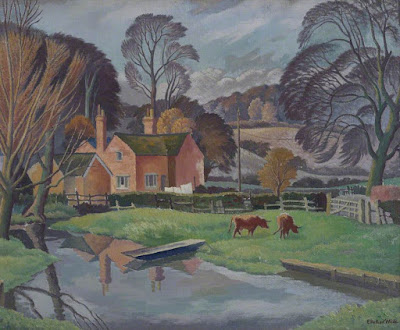





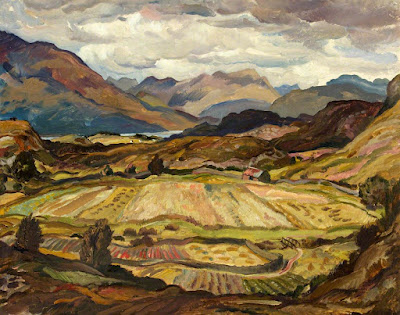

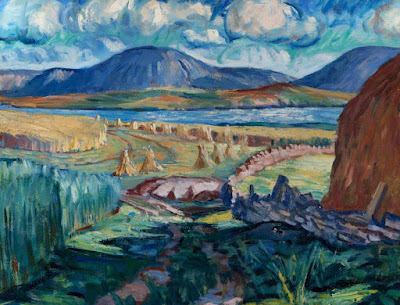


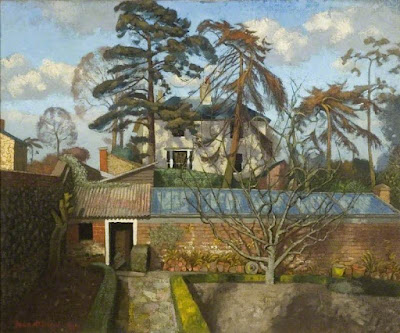



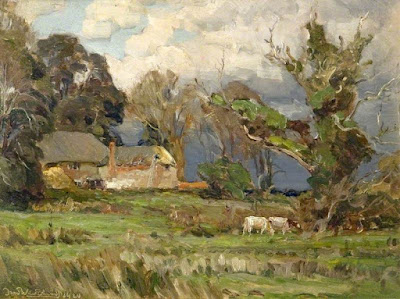



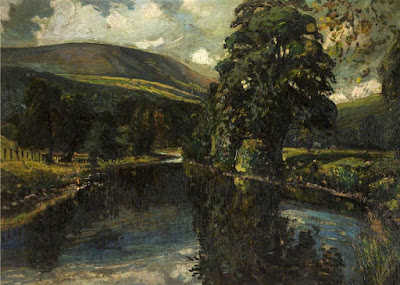





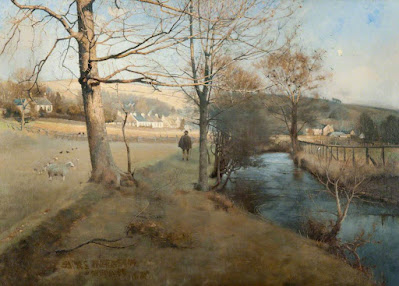


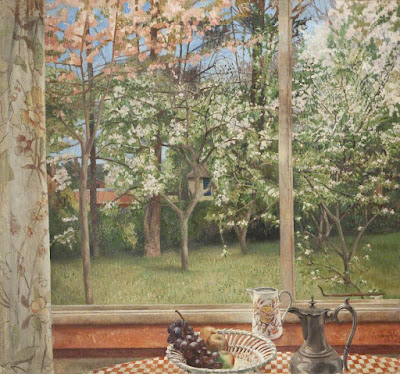
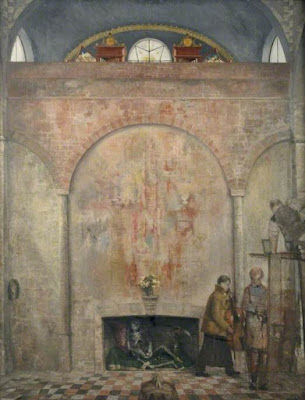
.jpg)